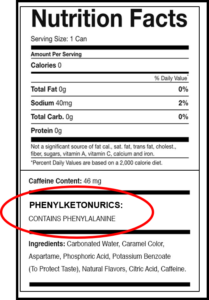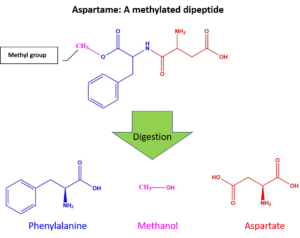
Have you ever read the Nutrition Facts on a diet soda or sugar-free gum? If so, you might have noticed a bolded sentence that reads: PHENYLKETONURICS: CONTAINS PHENYLALANINE. In the U.S., this sentence is present on every commercially available medicine, food, or beverage that contains the artificial sweetener aspartame. Often, this warning goes unnoticed, partly because it is nestled quietly at the foot of the list of ingredients and partly because it only applies to 1 in every 10,000 individuals in the United States. Nevertheless, this subtle message is essential for this subset of consumers.

Phenylketonuria (Phe·nyl·ke·ton·uria)
Those people are “Phenylketonurics,” or people with a rare metabolic disorder called Phenylketonuria (PKU). PKU is a genetic disorder that results in the inability to convert the amino acid phenylalanine (Phe) into the amino acid tyrosine (Tyr), both essential amino acids that are found in most protein. Phe’s most important biological function is its role as a precursor to Tyr, which is involved in many processes such as the synthesis of neurotransmitters. Without the ability to convert Phe to Tyr, there is less Tyr available for the synthesis of dopamine, norepinephrine, and epinephrine (all important neurotransmitters) and Phe can accumulate in the brain, resulting in local metabolic dysfunction. PKU can result in severe developmental complications and mental retardation if left untreated. Fortunately, PKU can be successfully managed by abiding by a strict low-protein diet, avoiding foods that contain sources of phenylalanine such as meats, fish, dairy, and nuts.
Now, you might ask, “How does PKU have anything to do with the Nutrition Facts on my Diet Coke?” Good question. The answer lies in the chemical structure of the aforementioned artificial sweetener, aspartame.

Aspartame, sold under the brand name NutraSweet, is a dipeptide that contains the amino acids aspartic acid and phenylalanine. Aspartame is rapidly hydrolyzed (i.e. split in two by water) into its respective amino acids in the small intestine, serving as a source of aspartic acid and phenylalanine. Thus, it is important to communicate the presence of aspartame in all artificially sweetened products, especially since the products that usually contain aspartame (soft drinks, candies, etc.) are not typical sources of phenylalanine.
Yet, nutrition labels aren’t just important for Phenylketonurics. With the increased incidence of heart disease, it’s more important now than ever to understand the nutritional value of the foods you’re eating. But, do not fear! Stay up to date on some of my upcoming articles for The Pipettepen and Nutrition at UNC and Translational Science where I’ll outline the basics for healthy eating and overall wellness!
Peer edited by Amanda Tapia.
Follow us on social media and never miss an article: